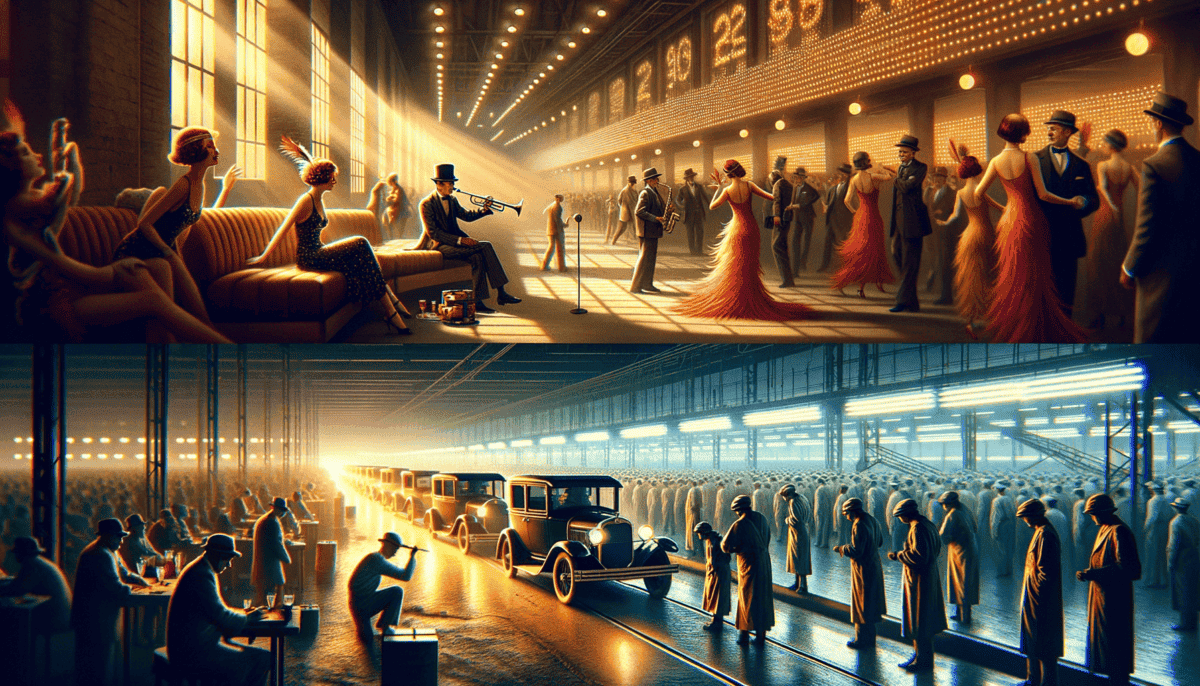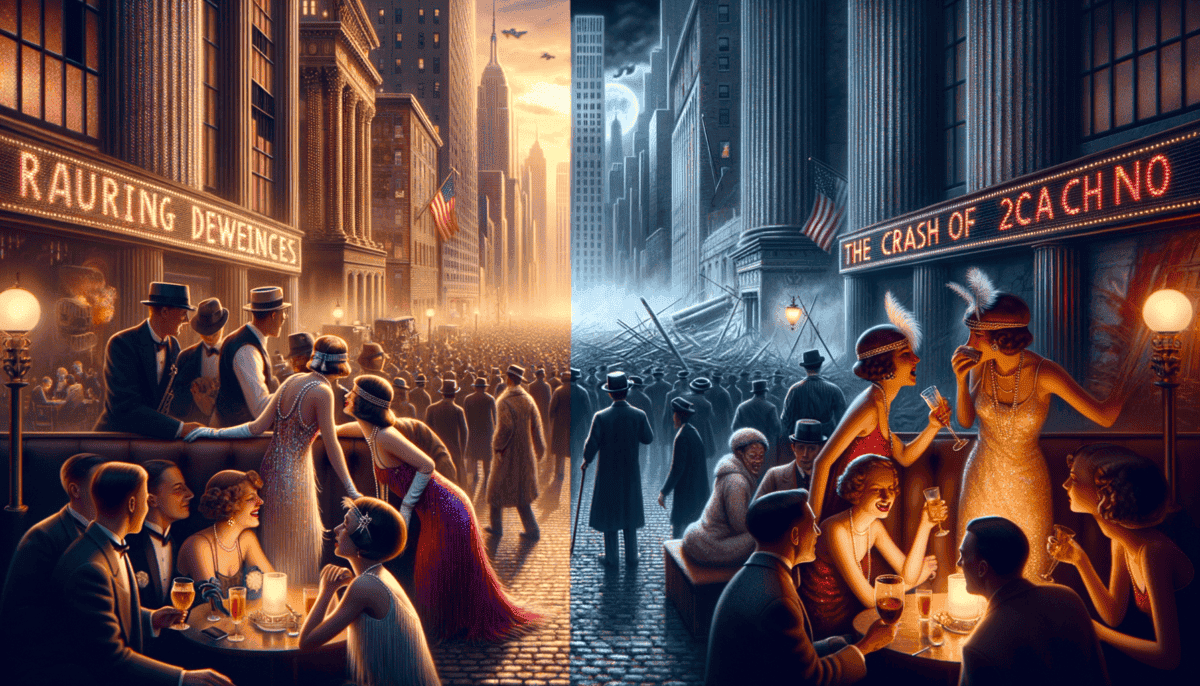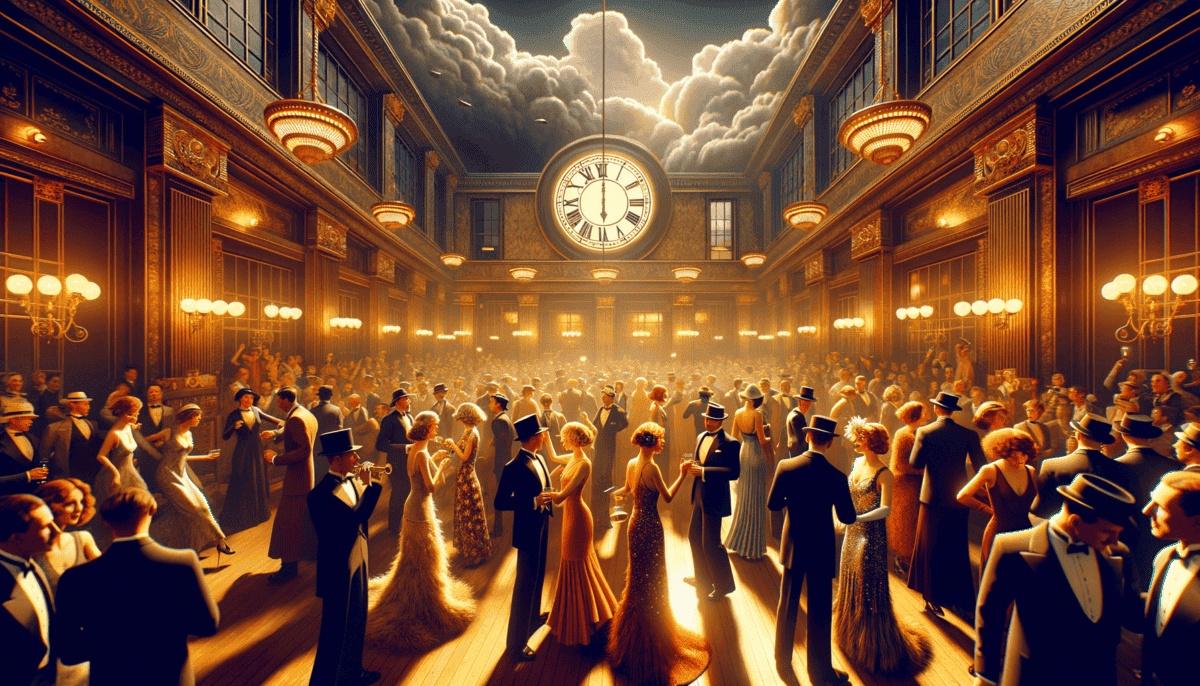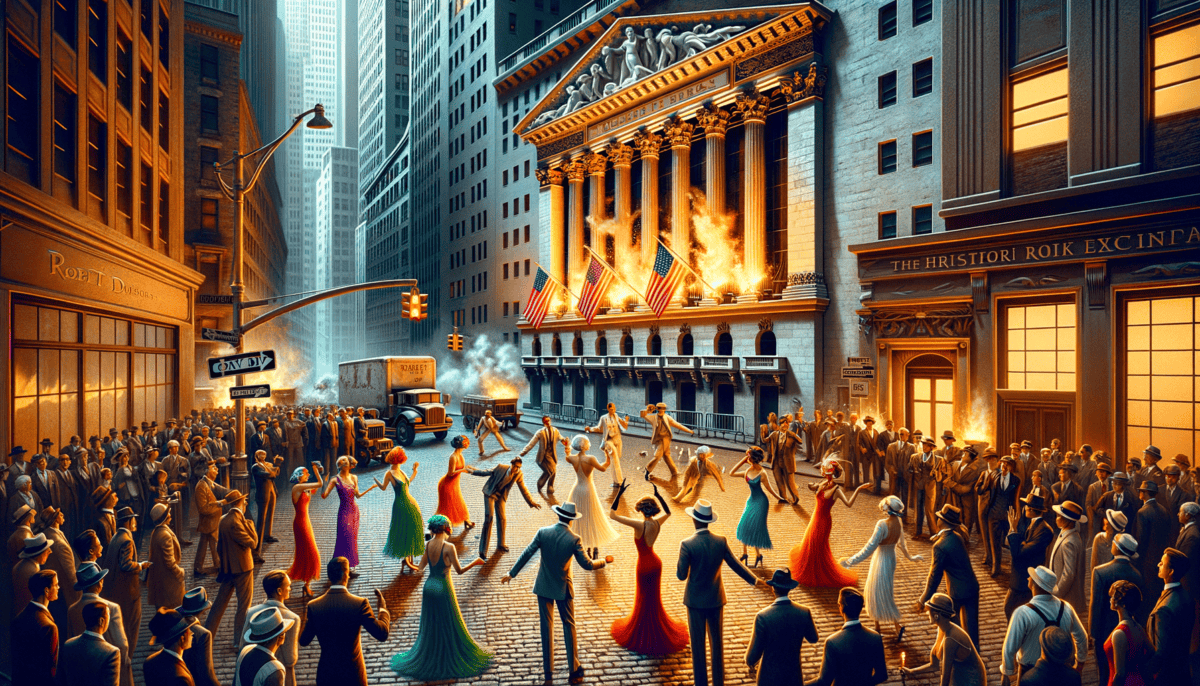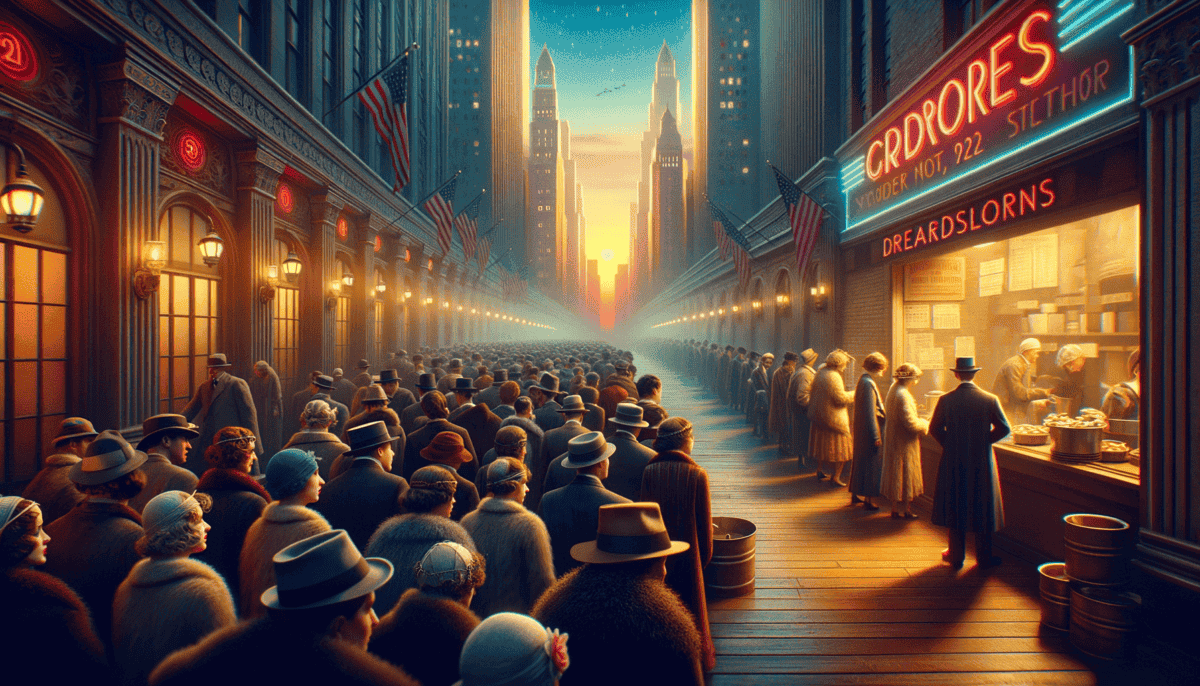Dancing into a New Era
Tommy tapped his feet to the jazzy beats flowing from his family's brand new radio. It was 1920, and everything felt different and exciting!
"Ma, can you believe we can hear music right in our living room?" Tommy asked, spinning around like the dancers he saw downtown.
His mother smiled, adjusting the radio's dial. "Things sure are changing fast, Tommy. Why, just last year we had to go to dance halls to hear music like this!"
A Time of Big Changes
The streets of New York were alive with energy. Bright electric lights lit up the night sky, and fancy cars zoomed down the roads. Young people danced new dances like the Charleston, and women wore shorter skirts and bobbed their hair short.
"The times they are a-changing!" Tommy's father would say every morning as he read the newspaper.
New Sounds, New Style
Jenny, Tommy's older sister, came twirling into the room in her new dress. It stopped at her knees – scandalous by old standards!
"Look what I learned!" Jenny exclaimed, demonstrating the Charleston. Her feet kicked out while her arms swung back and forth.
Tommy watched in amazement. Even their usually serious father was tapping his foot to the jazz music now playing on the radio.
Money and Dreams
"Business is booming!" Tommy often heard grown-ups say. People had more money to spend, and stores were full of new things to buy.
His father came home one day with exciting news. "I bought some stocks today!" he announced proudly. When Tommy looked confused, his father explained, "It's like buying a tiny piece of a big company. If the company does well, we make money!"
The Spirit of Youth
Everyone seemed full of hope. Young people especially felt like anything was possible. They could:
• Listen to new music on the radio
• Drive in automobiles
• Watch moving pictures
• Wear modern clothes
• Dance new dances
• Dream big dreams
Tommy looked out his window at the bustling city street below. A shiny car honked its horn as it passed by. Ladies in fashionable dresses walked arm in arm, their short hair bouncing with each step.
"This is going to be the most exciting time ever!" Tommy declared, jumping up to practice his own Charleston moves.
His mother nodded, but something in her eyes seemed worried. "Just remember, Tommy," she said softly, "what goes up must come down."
But Tommy was too busy dancing to notice. The music played on, and the whole world seemed to be dancing along with him into this bright new era.
The radio crackled with another jazz tune, and Tommy grabbed his sister's hands. They danced around the living room, their laughter mixing with the music. Outside, the city lights began to twinkle as the sun set on another exciting day in this new age of possibilities.
The Age of Amazing Machines
Tommy pressed his nose against the store window, watching the shiny new Model T Ford cars roll off Mr. Wilson’s showroom floor.
“Wow! They make five new cars every day!” Tommy exclaimed to his friend Billy. “My dad says it’s because of something called the ‘assembly line.'”
The Magic of Making Things
At school the next day, Miss Thompson explained how Mr. Ford’s assembly line worked. “Instead of one person building a whole car, each worker does just one small job. It’s like when we all work together to clean the classroom – it’s faster!”
Tommy raised his hand. “Is that why cars are cheaper now? Jimmy’s family just got one!”
“That’s right!” Miss Thompson smiled. “More people can buy cars because they don’t cost as much to make.”
Electricity Changes Everything
Back at home, Tommy watched his mother plug in their new electric washing machine. No more scrubbing clothes by hand!
“Remember when we used to read by candlelight?” his mother laughed, flicking on the electric lamp. “Now we just push a button!”
New inventions were everywhere:
• Electric refrigerators kept food cold
• Vacuum cleaners cleaned floors easily
• Telephones helped people talk to friends far away
• Radios brought music and news into homes
• Electric irons made clothes neat and wrinkle-free
Shopping Fever
Downtown was full of big stores with bright window displays. Jenny dragged Tommy past a shop window full of pretty dresses.
“Look at all the new things we can buy!” Jenny squealed. “And Ma says we can pay a little bit now and the rest later – it’s called ‘installment buying.'”
A World of Wonder
One evening, Tommy’s father brought home a surprise – a brand new radio with a big speaker!
“It’s not just for music anymore,” his father explained. “We can hear news from all over the country! And look – it’s electric, no more cranking!”
Tommy turned the dial carefully. Voices and music filled the room like magic.
Changes Big and Small
“Everything’s getting faster,” Tommy’s grandfather grumbled from his rocking chair. “In my day, we took our time.”
But Tommy loved the speed of modern life. He watched the electric trolley zoom past their house, carrying people to work in factories where machines helped make everything from cars to candy bars.
That night, as Tommy lay in bed listening to the hum of the city, he imagined all the amazing new inventions still to come. The world was changing so fast, and he couldn’t wait to see what tomorrow would bring.
Through his window, he could see the glow of electric lights stretching across the city, bright stars in a new mechanical sky. The future was here, and it was full of wonderful machines.
Money Mania on Wall Street
Tommy’s father burst through the front door, waving a piece of paper excitedly. “I bought stocks today!” he announced. “Mr. Johnson at the bank says everyone’s getting rich!”
A New Kind of Game
“What’s a stock?” Tommy asked, looking up from his radio set.
His father sat down, eyes sparkling. “It’s like owning a tiny piece of a big company. When the company makes money, we make money too!”
“Even Mrs. Baker, who cleans houses, bought stocks!” Tommy’s mother added. “She borrowed money from the bank to buy them.”
The Money Rush
Downtown, Tommy noticed more and more people crowding around the ticker tape machine in Mr. Wilson’s store window. The machine printed stock prices on long strips of paper.
“Look! United Steel went up again!” someone shouted. “I’m going to be rich!”
“Everyone’s making money,” whispered Jenny’s mother to Tommy’s mom. “My sister’s husband bought stocks on margin – that means he only paid a little bit of money to get lots of stocks!”
Not Everyone Joins the Party
Tommy’s grandfather shook his head when he heard about the stock market excitement.
“It’s like a game of hot potato,” he warned. “Someone’s going to get burned.”
Changes in the City
Tommy noticed big differences in how people lived. Some of his neighbors bought new cars and fancy clothes. Others, like old Mr. Peterson, still worked long hours just to buy food.
Things people did with their money:
• Bought expensive stocks
• Spent more on fancy things
• Borrowed money from banks
• Bought houses and cars
• Invested in new companies
Dreams and Worries
One evening, Tommy overheard his parents talking quietly after dinner.
“Maybe we should sell some stocks,” his mother whispered. “The prices can’t keep going up forever.”
“Don’t worry,” his father replied. “Mr. Johnson says this is just the beginning. We’ll be rich like the Rockefellers soon!”
Storm Clouds Growing
Tommy noticed more empty stores downtown. His friend Billy’s father lost his job at the factory, but nobody seemed worried – they were too busy watching stock prices climb.
At school, Miss Thompson taught them about saving money. “Remember,” she said, “it’s important not to spend more than you have.”
But outside the classroom windows, Tommy could see people rushing to the banks and broker offices, dreaming of easy riches. The excitement of the stock market fever had taken over the whole city.
That night, as Tommy counted his penny collection, he wondered about all the money people were making and losing in the mysterious world of Wall Street. The future seemed both exciting and scary, like a carnival ride that went faster and faster.
Danger Signs Appear
Tommy watched his father’s face grow worried as he read the morning newspaper. The happy smile from last month was gone.
Whispers of Trouble
“Steel stocks dropped again,” his father muttered. “That’s the third time this week.”
Tommy’s mother placed a gentle hand on his father’s shoulder. “Maybe we should sell some stocks, like I suggested?”
“No, no,” his father said quickly. “Mr. Johnson says they’ll go back up. They always do!” But his voice trembled slightly.
Changes at the Bank
Walking downtown with his mother, Tommy noticed something different at the bank. Long lines stretched out the door. People looked scared.
“I want my money back!” shouted Mrs. Baker, the cleaning lady. “The bank says I have to pay back my stock loans now!”
“The banks are getting nervous,” Tommy heard Mr. Wilson say. “They’re asking everyone to pay back their loans right away.”
The Worried City
Things people started doing:
• Selling their stocks quickly
• Taking money out of banks
• Stopping fancy purchases
• Looking for extra work
• Counting their savings carefully
Grandfather’s Warning
Tommy’s grandfather visited more often now. He sat in his favorite chair, listening to the radio news.
“I’ve seen this before,” he said softly. “When people get too excited about making easy money, trouble follows.”
School Days Change
At school, Tommy noticed fewer kids bringing lunch. His friend Billy wore the same torn sweater every day.
“My dad says we need to save money now,” Billy explained. “He lost his job and our stocks aren’t worth much anymore.”
The Big Meeting
One evening, Tommy peeked into his father’s study. Important-looking men in suits sat around the desk, talking in serious voices.
“The market’s too high,” one man said. “Stocks are worth more than the real companies!”
“But what can we do?” Tommy’s father asked, his voice shaky.
Signs of Fear
More stores closed downtown. The ticker tape machine that once drew excited crowds now sat alone in the window.
Tommy heard new words being whispered: “margin calls,” “panic selling,” “market crash.” He didn’t understand them, but he knew they made grown-ups nervous.
A Scary Night
That night, Tommy couldn’t sleep. He heard his parents talking late into the night.
“We should have listened to your father,” his mother said. “The signs were there.”
“Everything we saved…” his father’s voice trailed off.
Tommy hugged his teddy bear tighter, wondering what tomorrow would bring. The exciting party of the stock market was starting to feel more like a scary ghost story.
The Day Everything Changed
The morning of October 29, 1929, started like any other day. But it would soon become known as Black Tuesday.
The Morning Rush
Tommy woke up to shouting in the streets. People ran toward Wall Street, their faces white with fear.
“Mama, what’s happening?” Tommy asked at breakfast.
His mother’s hands shook as she poured his milk. “The stock market is having trouble, dear. Try to eat your breakfast.”
Downtown Chaos
Through his classroom window, Tommy saw more and more people running to the banks. His teacher, Miss Thompson, couldn’t focus on the lesson. She kept looking at the newspaper on her desk.
“Class dismissed early today,” she announced, her voice trembling.
The Crash Begins
Outside the stock exchange, hundreds of people pushed and shouted:
• "Sell everything!"
• "The market is crashing!"
• "We're ruined!"
• "Save what you can!"
“In just one day, people lost more money than anyone could count,” Tommy’s grandfather would later explain. “It was like all the money just disappeared into thin air.”
The Bank’s Big Problem
Tommy and his mother walked past their bank. The line stretched around the block.
“Please, I need my money!” cried Mrs. Johnson, Tommy’s neighbor.
“The bank is closed!” announced a guard. “No more withdrawals today!”
Father Comes Home Early
Tommy’s father arrived home at lunchtime, his face pale. He sat heavily in his chair.
“It’s gone,” he whispered. “All our savings… gone.”
Mother hugged him tight. “We still have each other,” she said softly.
News Spreads Fast
The radio crackled with urgent news. Tommy listened as announcers described the biggest stock market crash in history.
“Sixteen million shares sold today!” the radio buzzed. “Prices falling to nothing!”
Evening in the City
As the sun set, the streets grew quiet. Tommy saw Mr. Wilson, the banker, sitting on his front steps, head in his hands.
Rich people who owned big houses now worried about keeping them. Poor people worried about getting food.
A Family Meeting
That night, Tommy’s family gathered in the living room. His father looked tired but tried to smile.
“Things will be different now,” he explained. “We’ll have to be careful with money. But we’re lucky – we have our house and each other.”
Tommy’s grandfather nodded wisely. “We survived hard times before. We’ll survive this too.”
The City Sleeps
As Tommy went to bed that night, the city seemed darker than usual. The happy music from the dance halls was silent. The bright lights of Broadway dimmed.
He thought about his piggy bank, wondering if his coins were still worth anything. But mostly, he thought about all the scared faces he’d seen today.
The great party of the 1920s had ended. A new, harder time was beginning. But Tommy didn’t know yet just how much things would change.
Starting Over
The cold winter wind blew through New York’s empty streets. The once-bustling city felt different now. ️
A Changed World
Tommy watched his breath make little clouds in the cold morning air. The shiny cars that once filled the streets were gone. People walked everywhere now.
“Look, Tommy,” his mother pointed to a long line of people. “That’s a bread line. People get free bread there when they can’t buy food.”
Finding Ways to Help
Tommy’s family started growing vegetables in their small backyard. His mother taught other families how to make soup that could feed many people.
“We share what we have,” she explained. “That’s how we all get through this.”
“Hard times show us who we really are,” Grandfather said. “And they show us how strong we can be together.”
School Changes
At school, Miss Thompson started a lunch-sharing program. Kids who had extra food shared with those who had none.
“Remember,” she told the class, “kindness matters more than money.” ❤️
Community Spirit
People found creative ways to help each other:
• Neighbors shared gardens and tools
• Families took in relatives who lost homes
• Communities started free soup kitchens
• Kids helped collect and share supplies
New Laws to Help
President Roosevelt made new rules to protect people’s money. Banks became safer. Workers got better protection. ️
Learning Important Lessons
Tommy’s father found a new job helping build roads. “Sometimes,” he said, “we have to start over. But that’s okay. We learn and grow stronger.”
The family saved every penny. They fixed old clothes instead of buying new ones. They learned the difference between wants and needs.
Hope Grows
Slowly, things began to improve. People helped each other more than before. They learned important lessons about saving money and being careful with what they had.
“We’re all connected,” Tommy’s mother said. “Rich or poor, we need each other.”
Looking Forward
One spring morning, Tommy noticed new flowers pushing through the dirt in their vegetable garden.
“Look, Mama!” he called. “New life is growing!”
She smiled. “Yes, Tommy. That’s how it always works. After hard times, good things grow again.”
The crash of 1929 changed America forever. But it also taught important lessons about helping others, being careful with money, and staying strong during tough times.
Tommy grew up remembering these lessons. He taught them to his own children and grandchildren. The story of the great crash became a story of how people can help each other and grow stronger together.
And in the end, that was the most valuable lesson of all.


